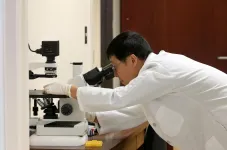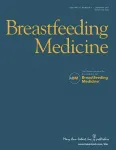(Press-News.org) One third (35%) of people who took a new drug for treating obesity lost more than one-fifth (greater than or equal to 20%) of their total body weight, according to a major global study involving UCL researchers.
The findings from the large-scale international trial, published today in the New England Journal for Medicine, are being hailed as a "gamechanger" for improving the health of people with obesity and could play a major part in helping the UK to reduce the impact of diseases, such as COVID-19.
The drug, semaglutide, works by hijacking the body's own appetite regulating system in the brain leading to reduced hunger and calorie intake.
Rachel Batterham, Professor of Obesity, Diabetes and Endocrinology who leads the Centre for Obesity Research at UCL and the UCLH Centre for Weight Management, is one of the principal authors on the paper which involved almost 2,000 people in 16 countries.
Professor Batterham (UCL Medicine) said: "The findings of this study represent a major breakthrough for improving the health of people with obesity. Three quarters (75%) of people who received semaglutide 2.4mg lost more than 10% of their body weight and more than one-third lost more than 20%. No other drug has come close to producing this level of weight loss - this really is a gamechanger. For the first time, people can achieve through drugs what was only possible through weight-loss surgery."
Professor Batterham added: "The impact of obesity on health has been brought into sharp focus by COVID-19 where obesity markedly increases the risk of dying from the virus, as well as increasing the risk of many life-limiting serious diseases including heart disease, type 2 diabetes, liver disease and certain types of cancers. This drug could have major implications for UK health policy for years to come."
The average participant in the trial lost 15.3kg (nearly 3 stone); this was accompanied by reductions in risk factors for heart disease and diabetes, such as waist circumference, blood fats, blood sugar and blood pressure and reported improvements in their overall quality of life.
The trial's UK Chief Investigator, Professor John Wilding (University of Liverpool) said: "This is a significant advance in the treatment of obesity. Semaglutide is already approved and used clinically at a lower dose for treatment of diabetes, so as doctors we are already familiar with its use. For me this is particularly exciting as I was involved in very early studies of GLP1 (when I worked at the Hammersmith Hospital in the 1990s we were the first to show in laboratory studies that GLP1 affected appetite), so it is good to see this translated into an effective treatment for people with obesity."
With evidence from this trial, semaglutide has been submitted for regulatory approval as a treatment for obesity to the National Institute of Clinical Excellence (NICE), the European Medicines Agency (EMA) and the US Food and Drug Administration (FDA).
About the trial
The Phase III 'STEP'* randomised controlled trial involved 1,961 adults who were either overweight or had obesity (average weight 105kg/16.5 stone; body mass index 38kg/m2), and took place at 129 sites in 16 countries across Asia, Europe, North America, and South America.
Participants took a 2.4mg dose of semaglutide (or matching placebo) weekly via subcutaneously (under the skin) injection; similar to the way people with diabetes inject insulin. Overall, 94.3% of participants completed the 68-week study, which started in autumn 2018.
Those taking part also received individual face-to-face or phone counselling sessions from registered dietitians every four weeks to help them adhere to the reduced-calorie diet and increased physical activity, providing guidance, behavioural strategies and motivation. Additionally, participants received incentives such as kettle bells or food scales to mark progress and milestones.
In those taking semaglutide, the average weight loss was 15.3kg (nearly three stone), with a reduction in BMI of -5.54. The placebo group observed an average weight loss of 2.6kg (0.4 stone) with a reduction in BMI of -0.92.
Those who had taken semaglutide also saw reductions in risk factors for heart disease and diabetes, such as waist circumference, blood fats, blood sugar and blood pressure and reported improvements in their overall quality of life.
About the drug
Semaglutide is clinically approved to be used for patients with type 2 diabetes, though is typically prescribed in much lower doses of 1mg.
The drug possesses a compound structurally similar to (and mimics) the human glucagon-like peptide-1 (GLP-1) hormone, which is released into the blood from the gut after meals.
GLP-1 induces weight loss by reducing hunger, increasing feelings of fullness and thereby helping people eat less and reduce their calorie intake.
While the STEP study has been through Phase I and II trials, assessing the 2.4mg doses for safety, in the Phase III trial some participants reported side effects from the drug including mild-to-moderate nausea and diarrhoea that were transient and generally resolved without permanent discontinuation from the study.
INFORMATION:
The international trial was funded by the pharmaceutical company Novo Nordisk.
* Semaglutide Treatment Effect in People with Obesity (STEP)
MUSC Hollings Cancer Center researchers found that a single strain of bacteria may be able to reduce the severity of graft-versus-host disease (GVHD), as reported online in February 2021 in JCI Insight.
Bone marrow transplant can be a lifesaving procedure for patients with blood cancers. However, GVHD is a potentially fatal side effect of transplantation, and it has limited treatment options. This proof-of-concept study demonstrates that better treatment options may be on the horizon for patients with GVHD.
Xue-Zhong Yu, M.D., associate director of Basic Science at Hollings Cancer Center, and lead ...
Researchers at the University of Maryland School of Medicine (UMSOM) and their colleagues published a new analysis today in the journal Nature from genetic sequencing data of more than 53,000 individuals, primarily from minority populations. The early analysis, part of a large-scale program funded by the National Heart, Lung, and Blood Institute, examines one of the largest and most diverse data sets of high-quality whole genome sequencing, which makes up a person's DNA. It provides new genetic insights into heart, lung, blood and sleep disorders and how these conditions impact people with diverse racial and ...
A team, including an astronomer from the University of Hawai?i Institute for Astronomy (IfA), have confirmed a planetoid that is almost four times farther from the Sun than Pluto, making it the most distant object ever observed in our solar system. The planetoid, nicknamed "Farfarout," was first detected in 2018, and the team has now collected enough observations to pin down the orbit. The Minor Planet Center has now given it the official designation of 2018 AG37.
Farfarout's name distinguished it from the previous record holder "Farout," found by the same team of astronomers in 2018. The team includes UH Mānoa's David Tholen, Scott S. Sheppard of ...
The United States spends more than $200 billion every year in efforts to treat and manage mental health. The onset of the coronavirus pandemic has only deepened the chasm for those experiencing symptoms of depression or anxiety. This breach has also widened, affecting more people.
New research from Carnegie Mellon University, University of Pittsburgh and University of California, San Diego found that 61% of surveyed university students were at risk of clinical depression, a value twice the rate prior to the pandemic. This rise in depression came alongside dramatic shifts in lifestyle habits.
The study documents dramatic changes in physical activity, sleep and time use at the onset ...
UNIVERSITY PARK, Pa. -- The descriptions on the fronts of infant and toddler food packages may not accurately reflect the actual ingredient amounts, according to new research. The team found that vegetables in the U.S. Department of Agriculture's "dark green" category were very likely to appear in the product name, but their average order in the ingredient list was close to fourth. In contrast, juice and juice concentrates that came earlier on the ingredient list were less likely to appear in product names.
"Early experiences with food can mold children's preferences and contribute to building healthful, or unhealthful, eating habits that last a lifetime," said author Alyssa Bakke, staff sensory scientist, Penn State. "Our previous work found combining ...
New Rochelle, NY, February 10, 2021--It may be safe for COVID-infected mothers to maintain contact with their babies. Keeping them apart can cause maternal distress and have a negative effect on exclusive breastfeeding later in infancy, according to The COVID Mothers Study published in the peer-reviewed journal Breastfeeding Medicine. Click here to read the article now.
In this worldwide study, infants who did not directly breastfeed, experience skin-to-skin care, or who did not room-in within arms' reach of their mothers were less likely to be exclusively breastfed in the first 3 months of life. Nearly 60% of ...
Oil and water may not mix, but adding the right nanoparticles to the recipe can convert these two immiscible fluids into an exotic gel with uses ranging from batteries to water filters to tint-changing smart windows. A new approach to creating this unusual class of soft materials could carry them out of the laboratory and into the marketplace.
Scientists at the National Institute of Standards and Technology (NIST) and the University of Delaware have found what appears to be a better way to create these gels, which have been an area of intense research focus for more than a decade. ...
SAN ANTONIO -- Humans possess a formidable multi-layered defense system that protects us against viral infections. Better understanding of these defenses and the tricks that viruses use to evade them could open novel avenues for treating viral infections and possibly other diseases.
For example, a human protein called SAMHD1 impedes replication of the human immunodeficiency virus (HIV) and other viruses by depleting deoxynucleotides -- building blocks needed for the replication of the viral genome. It has long remained a mystery whether and how this protein is activated in response to infection.
Now researchers from The University of Texas Health Science Center at San Antonio (UT Health San Antonio) have discovered that SAMHD1 recognizes a unique molecular ...
Sawfish have disappeared from half of the world's coastal waters and the distinctive shark-like rays face complete extinction due to overfishing, according to END ...
EAST LANSING, Mich. - The 1918 influenza pandemic provides a cautionary tale for what the future may hold for COVID-19, says a Michigan State University researcher.
After a decade studying a flu virus that killed approximately 15,000 Michigan residents, Siddharth Chandra, a professor in MSU's James Madison College, saw his research come to life as he watched the spread of the COVID-19 pandemic.
"It was so surreal," said Chandra, who has a courtesy appointment in epidemiology and biostatistics. "All of a sudden, I was living my research."
Chandra's research is published in the American Journal of Public Health with co-authors Julia Christensen, a graduate of James Madison College; Madhur Chandra, Senior ...




